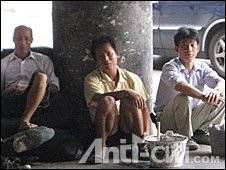【中文标题】中国农民工的新希望
【原文标题】New hope for China's migrant workers
【登载媒体】CNN
【原文链接】http://news.bbc.co.uk/2/hi/programmes/from_our_own_correspondent/8271056.stm
【译者】满仓
全球经济危机造成中国数百万农民工失去了工作,但是,Lesley Curwen来到长沙时发现,这种现状出现了转机。
这是一个布满灰尘的巨大空间,有硕大的窗户和高高的天花板,或许有西方教堂的两倍大小。
但是这里却没有基督教的气氛,而是人声嘈杂,充满了似乎是一千个人同时出汗的潮湿味道。

中国很多临时工为找工作而一筹莫展。
这是湖南省长沙火车站的第三候车大厅,从这里到北京有14个小时的车程。
2000万来自中国农村地区的农民工在去年失去了工厂里的工作,原因是全球经济危机。
他们不得不放弃城市的生活,回到家里,回到自己的小片土地上。
但是在过去的几个月里,根据中国政府的报道,他们又再次动身,怀着希望回到城市里。
新的工作机会
在坐着候车的人群里,我找到了楚庆虎(音译),一个又瘦又高、穿着条格衬衫的30岁害羞男人。
他和其他两个来自同一个村子的人得到了一个工作机会,地点是东南沿海省份广东的一个陶器厂,那里是中国制造业的大本营。
他说,在他居住的山区村庄里,没有工厂,也没有钱,连到周边地区走一走都很困难。
他的母亲和他的两个孩子靠自己种植的蔬菜生活,但是再没有多余的钱可以用来买东西了,这是他决定前往广东的原因。
陪伴楚庆虎和另外两个人到新工作地去的人是一个健谈的小个子,他实际上是这个工厂老板的父亲。
他说,工厂需要招聘新人,因为形势开始有所好转了。但是他们的核心出口业务遭到了毁灭性的打击。
当回忆起外国买家支付了30%订金,而无法支付尾款的时候,他不住地摇着头。
他闷闷不乐地说:“我们只好把没有人要的商品放在储藏室里。”而所谓的储藏室,实际上就是这些新工人睡觉的临时宿舍,他们似乎也不大在意。
我看着楚庆虎脸上的笑容,心里在想他的新工作能否长久。随着西方国家逐渐走出经济衰退的阴影,中国各地的工厂经理都对出口形势好转抱有一线希望。
本地市场
几十年以来,出口带来了经济的腾飞式增长。但是现在中国认识到,这种经济模式并不持久。
这个国家太容易受到经济震荡的影响,比如信用危机。温家宝总理呼吁,中国必须为本地市场提供更多的商品。
我遇到了一个直接受益于此趋势的人。她叫李芳(音译),一个简朴、自信的22岁年轻女人。她刚刚在长沙附近的吉利汽车厂找到一份不错的工作。
我和她见面的地方要比这个火车站更加噪杂,我的鼻孔中全是热金属的味道。
工人们拿着像是来自50年代漫画书中的死光枪,用复杂的芭蕾舞步,靠近车体焊接零部件,黄色的火花拉出美丽的弧线。

吉利和其它中国汽车制造商希望能走向世界。
这是家庭用车“远景”的生产流水线,这个车型的销售量上升了38%,大部分都销售给中国用户。
公司应当感谢政府的经济刺激政策,它使用折扣和补贴等方法来吸引人们购买新车,比如远景。工厂刚刚吸纳了300名新工人,包括李芳。
她开始对自身的价值产生了强大的自信。作为一名可以讲英文的大学毕业生,她告诉我流水线的工作“太简单了”,她会努力在技术部门找一份更好的工作。
“我要做一个经理,”她宣布,“我有能力。”
李芳算是幸运的,可以在吉利工作,她的很多同学现在依然在失业。她大部分时间都住在厂区内的宿舍公寓里,在工人食堂吃饭。
那么,她的工作会不会比楚庆虎在生产出口产品的陶器厂的工作更安全呢?
应该是的,她的工厂在做政府想要的东西,在努力生产出可以吸引中国消费者的产品。
但是,如果经济刺激的资金用完、减税和补贴政策停止了怎么办呢?中国的消费者还会继续消费吗?
有些行业曾经发出负面的警告,中国股市和房地产市场的泡沫即将破灭,这会导致另一个经济增长的痛苦期。
汽车伴随着尖锐的声音通过了流水线的终点,喇叭测试区发出刺耳的声音。我向李芳告别。
她微笑着向我挥手,这是乐观情绪的真实表现。是这种乐观的精神让中国成为世界第三大经济体。
原文:
Millions of rural migrants lost their jobs in China's cities as a result of the global economic downturn, but there are signs of a recovery as Lesley Curwen found on a visit to Changsha.
It was a great dusty cavernous space, with tall windows and high ceilings, perhaps twice the size of a Western church.
But there the ecclesiastical image broke down. It hummed with loud chatter and the smell of about a thousand people sweating in clammy unison.
Many Chinese casual workers have struggled for work
It was waiting room number three at Changsha railway station, in Hunan province, 14 hours by train from the capital Beijing.
Twenty million migrant workers from China's countryside had lost their jobs in factories in the last year, because of the global downturn.
They had given up on city life to go back to their families and small plots of land.
But in the last few months, according to the Chinese government, they have been on the move again, travelling with hope back towards the cities.
New recruits
Somewhere in the seated crowd, I found Chu Qinghu, a lanky, shy 30 year old in a striped shirt.
He and two others from his village had been promised jobs at a pottery factory in the south-eastern coastal province of Guangdong, a stronghold of Chinese manufacturing.
In his mountainous village, he explained, there were no factories and no money, and even getting around was difficult.
His mother and his two children could survive on the vegetables they grew, but there was no money for other expenses. That is why he was on his way to Guangdong.
Chu Qinghu and the others were being escorted to their new workplace by a voluble chap, who turned out to be the father of the factory owner.
The new recruits were needed, he said, because things were starting to pick up. But their key export business had been hit badly.
He shook his head, remembering how foreign buyers had paid 30% deposits on their orders, but failed to pay the rest.
"We just had to stick the unwanted goods in a storeroom," he said glumly. And a storeroom, it emerged, was where the new workers would be sleeping in a makeshift dormitory. It didn't seem to bother them.
As I watched Chu Qinghu's smiling face, I wondered how safe his new job would be. The managers of factories across China are hoping against hope that exports will bounce back as Western countries come out of recession.
Home market
For decades, exports delivered galloping economic growth. But now China has accepted that economic model is not sustainable.
It leaves the country too vulnerable to shocks like the credit crisis. The Premier Wen Jiabao has pledged that China must instead make more stuff for its own home markets.
I met someone who has benefited directly from that drive. She is Li Fung, a neat, confident young woman of 22 who recently got a prized job at the Geely car factory just outside Changsha.
I met her in an even noisier place than the railway station. My nostrils were clogged with the scent of hot metal.
Workers bearing what looked like death-ray guns from a 1950s comic were darting about in a complex ballet, leaning into car bodies to solder parts, generating great tails of yellow sparks.
Geely and other Chinese carmakers hope to grow globally
It was the assembly line for the Vision family car. Sales have risen 38%, with most of the cars sold to Chinese customers.
The company can thank the government's economic stimulus policy, which uses discounts and subsidies to tempt people into buying new cars like the Vision. The factory has taken on 300 new workers, including Li Fung.
She turned out to have a strong sense of her own worth, as a university graduate who speaks English. She told me she had found work on the assembly line "too easy", so she pushed hard to get a better job in the technology department.
"I want to be a manager," she announced. "I have the ability."
Still, Li Fung is lucky to work at Geely. Many of her fellow graduates are still jobless. She lives most of the time in an apartment block on the factory complex, and eats in the works canteen.
So is it possible that her job might be safer than Chu Qinghu's at the pottery factory which makes exports?
Yes, her factory is doing what the government wants. It is churning out products which attract Chinese consumers.
But what happens when the stimulus money and the tax cuts and the subsidies run out? Will customers in China keep on buying?
There are dark warnings from some quarters that bubbles in China's stock market and property market may yet burst, which might lead to another painful dip in growth.
I said goodbye to Li Fung as cars screeched off the final assembly line, hooting wildly as the horns got a thorough testing.
She grinned and waved, a living embodiment of the kind of optimism that has made China the third-biggest economy in the world. |